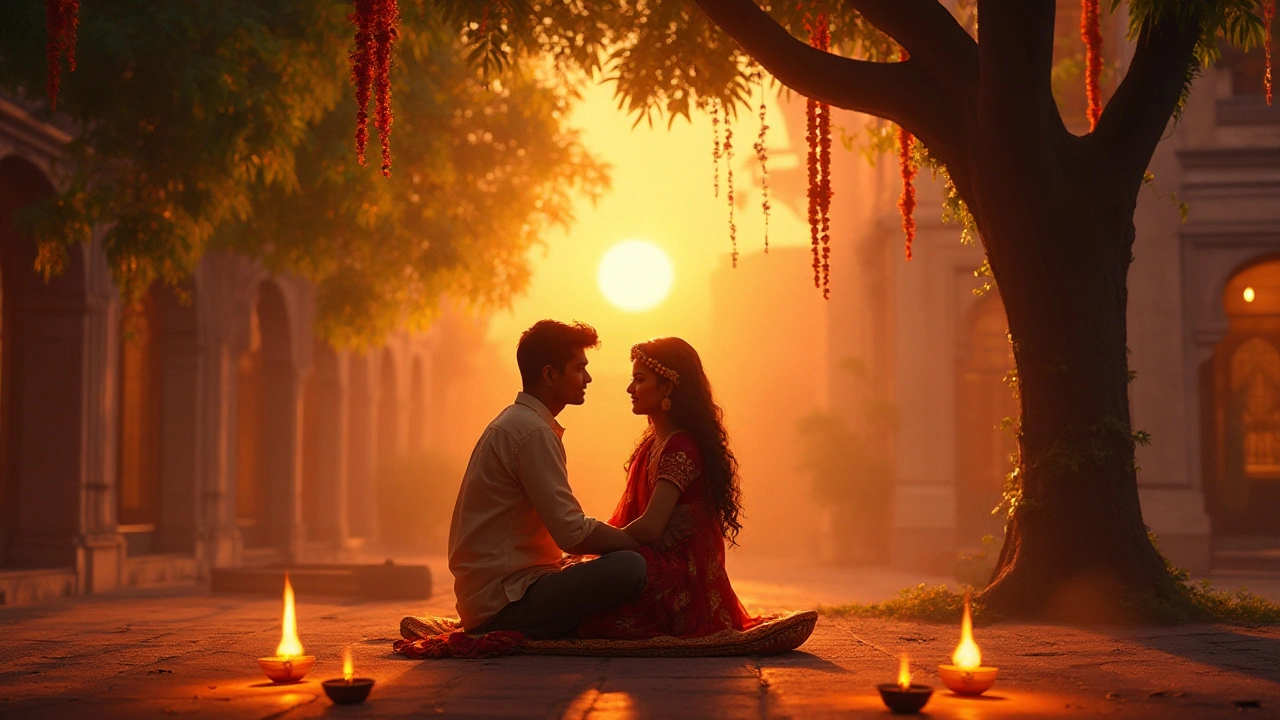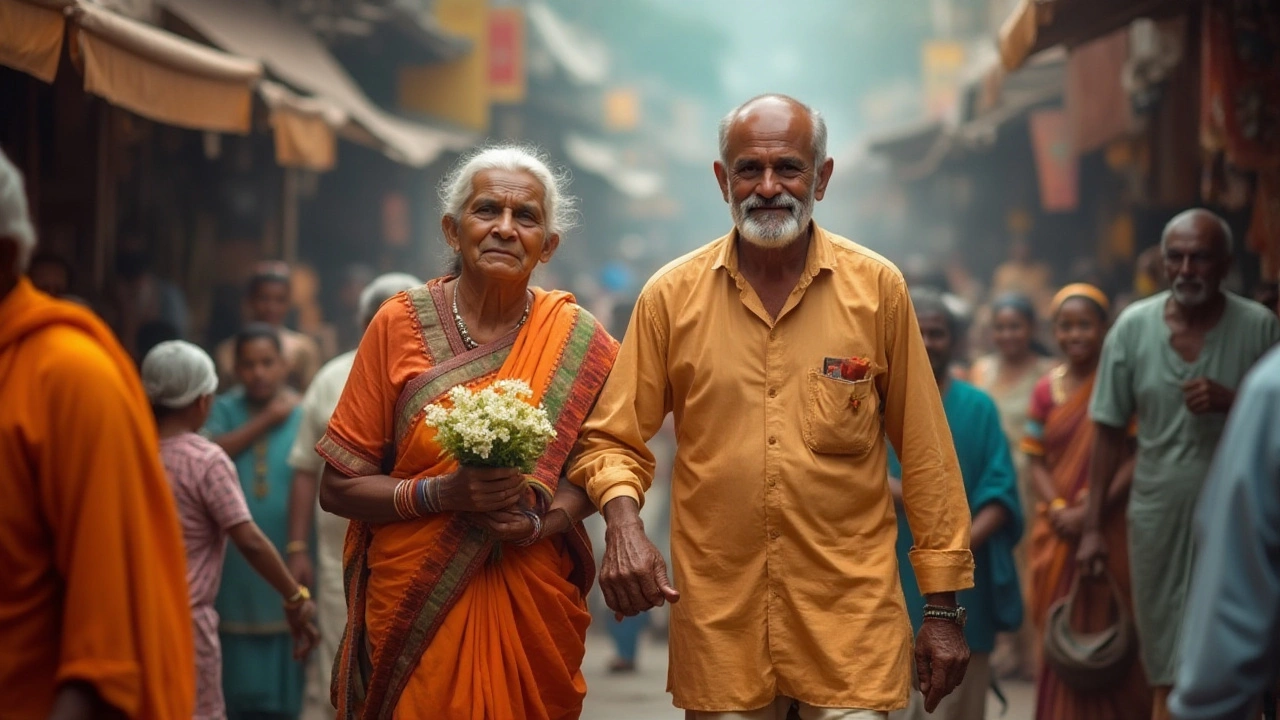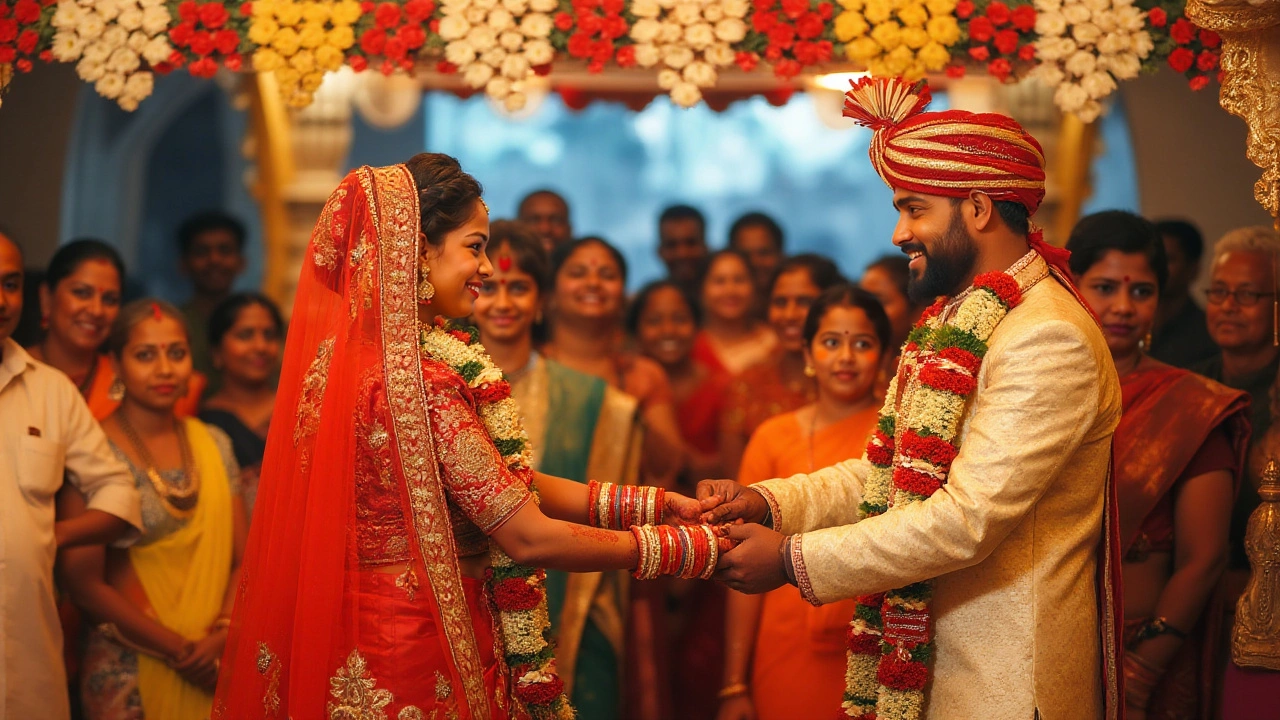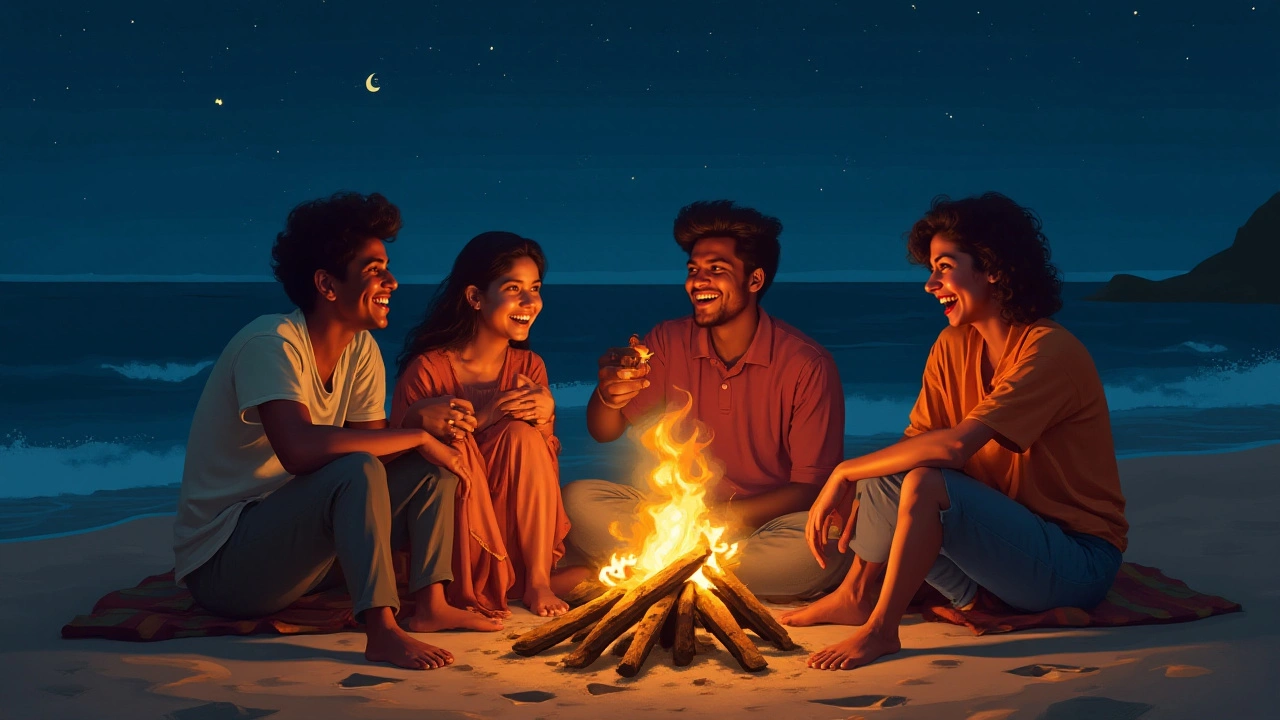Decoding Love: A Singular Word Perspective
 Dec, 16 2024
Dec, 16 2024
Love, a word that dances on the edges of interpretation, is a concept that permeates every heart and culture. Its nature is as varied as the people who experience it, yet it yearns for a singular expression—a word that can encapsulate its depth and breadth.
In a country as diverse as India, love speaks in myriad tongues, each echoing different textures of human connection. From the passionate embraces of Bollywood romances to the quiet devotion seen in age-old traditions, love is both a universal and uniquely personal emotion.
What if we could distill this vast sentiment into one word? What word could possibly hold the weight of hearts woven together by time, stories, and emotions? Through a journey into cultural meanings and personal reflections, we seek not just to define love but to celebrate its essence in a single word.
The Essence of Love
Love, perhaps more than any other emotion, defies a simplistic explanation. This feeling, deeply embedded in both heart and mind, forms the cornerstone of human experiences, uniting us through shared joys and hardships. In contemplating the essence of love, one might first consider its overwhelming power to transform routines into remarkable memories and strangers into soulful connections. Just like a river that carves landscapes over centuries, love quietly yet profoundly shapes our lives.
Love is not merely the domain of poets and playwrights, although they frequently dive into its profound depths. Science, too, seeks to decode this compelling bond. Studies have shown that love triggers the release of dopamine, the same chemical responsible for the body's pleasure and reward system, emphasizing our instinctual drive to pursue and nurture these connections. Love, in its scientific guise, becomes the ultimate motivator, encouraging us to seek out meaningful relationships that bear social, emotional, and evolutionary benefits.
Though science can explain the release of chemicals like oxytocin and serotonin in a fleeting embrace or a tender glance, it fails to capture the essence of its intangibility. As novelist Leo Tolstoy observed, "Love is life. All, everything that I understand, I understand only because of love." Through this lens, love transcends mere chemical reactions; it becomes a language of understanding that whispers the subtler truths of the world around us. A surprising fact is how love can influence cultural and societal norms, adapting itself to fit the backdrop of tradition while simultaneously challenging it.
The perspective of relationships and emotions in India highlights this transformative essence. Here, love is viewed not just through individual romantic entanglements but through familial and societal commitments that emphasize community bonds. The stories of Krishna and Radha, for example, encapsulate both divine and human love. Their narrative is woven deeply into the cultural fabric, teaching lessons about devotion, sacrifice, and the transcendental nature of love across lifetimes. The essence of love, when viewed through such tales, speaks of immortality and unwavering connection that extends beyond physical presence.
To fully appreciate love's essence, one may need to explore the varieties of emotional experiences it encapsulates. In India, love often begins in the heart but finds its strength in shared cultural expressions, whether through a silent prayer in a temple or a vibrant festivity on the streets. This collective experience of love fosters community resilience, which in turn nurtures personal growth. Recognizing this dual role of love—as both a personal guide and a societal glue—ensures that it remains a defining feature of our human journey. While it might sound ambitious, it's this unwavering belief in love that carries societies forward, making our intricate web of connections meaningful and enduring.

Cultural Interpretations
Culture shapes every facet of human life, and love is no exception. In India, a land of immense diversity, love finds expressions as textured as its many dialects. Each region boasts unique traditions, stories, and norms that weave together to create a rich tapestry of emotion. For example, the Tamil concept of Kaadhal highlights an intense, romantic longing, while in Punjabi culture, love often blends seamlessly with strong familial and community ties, creating a collective dynamic.
Bollywood, with its vibrant storytelling, serves as a mirror to Indian society's complex relationship with love. Movies frequently portray grandiose romantic gestures, reinforcing the notion that love is not just a feeling but a triumphant adventure. Through its cinema, India does not shy away from exploring love in all its forms, from passionate to sacrificial. As social norms evolve, so does the film industry's representation of love, increasingly mindful of contemporary discussions around equality and personal freedom.
"Love, as depicted in Indian cinema, is a canvas painted with the hues of time, tradition, and transformation," suggests renowned filmmaker Mira Nair.Interestingly, the Vedic texts, such as the Upanishads, describe love as the ultimate aim of human life, intertwined with the pursuit of knowledge, dharma, and spiritual fulfillment. These ancient writings remind us that the Indian spiritual heritage views love as a profound connection to both oneself and the universe.
Today, digital platforms have broadened the canvas upon which young Indians paint their stories of love. From swipes to text exchanges, the nature of attraction and romance is continuously reimagining itself, transcending geographical barriers. In a survey conducted by the Pew Research Center, nearly 60% of Indian young adults expressed that social media plays a crucial role in their romantic relationships. It brings fresh challenges and opportunities for defining love in new terms. Such changes invite a dialogue between the past and the present, forging a link between tradition and modernity while maintaining cultural authenticity. Thus, in India, love is an ever-evolving narrative, eternally inspired by its storied past and fueled by the aspirations of the present generation.

Personal Connections
When it comes to the intricate tapestry of human emotions, love undoubtedly holds a preeminent position. It is a compelling force that connects us, often profoundly, to those around us. Personal connections, rooted deeply in the heart, give love its intimate and transformative character. In the bustling, colorful locales of India, such connections can take myriad forms, influenced by traditions yet evolving with modernity. Each connection shapes our understanding of what love truly means, often defying the boundaries of language and definition.
Consider the bond between a parent and child, often considered unbreakable and profoundly unconditional. This relationship is built on years of nurturing and care, translating into a wordless understanding and support. Across India, this connection is mirrored through rituals and traditions, like during the festival of Raksha Bandhan, where siblings reaffirm their bonds, exchanging promises of protection and love. In these moments, love transcends verbal expression, deeply anchored in shared experiences and cultural fabric.
Romantic love, another facet, often dances between poetic endeavors and pragmatic considerations. Whether it's the vibrant stories of legendary lovers like Laila-Majnu or the everyday couple navigating the complexities of marriage, this type of connection thrives on both passion and patience. In urban settings, where the hustle never seems to cease, love manifests through small acts—a cup of chai waiting on the kitchen counter, or a text message exchanged during a busy day. These seemingly mundane moments pile up, creating a profound narrative that defines love for many.
Friendships too hold a special place in weaving the web of personal connections. They bring warmth, laughter, and sometimes, a gentle nudge when we veer off our paths. In India, friendships can be lifelong treasures, as seen in the fervent celebrations of Friendship Day, marked by the exchange of bands and heartfelt tokens. Such connections often blur lines, transforming friends into chosen family, further enriching our emotional dimensions.
In a broader sense, love is an emotion that fuels the bonds forming the heart of a community. It is this sense of camaraderie and shared destiny that binds neighbors, townsfolk, and citizens. From collective celebrations of festivals to standing in solidarity during trying times, these community bonds depict yet another vital shade of love. During the Diwali celebrations, for instance, communities come alive with collective joy, enthusiasm, and a unifying spirit, making the festival of lights profoundly personal for everyone involved.
As the writer Leo Tolstoy once articulated, "Love... it binds everything together and makes the world lovable." This binding quality of love, deeply tied to personal connections, forms the cornerstone of society's fabric. These connections, whether deep-rooted or newly discovered, provide meaning, understanding, and perspective, making each experience unique. As people across India—and indeed the world—explore these connections, seeking to explain love in one word becomes both a challenge and a journey in itself.

Defining Love in India
Love in India is a vibrant tapestry woven with threads of culture, tradition, and evolving modernity. Unlike many Western cultures where love is often about individual fulfillment, in India, the definition extends beyond the confines of personal desires. It embodies a harmonious coexistence of duty, community, and passion. The emotion is entangled with respect and responsibility, often transcending the lovers themselves to include families and societal expectations. This unique blend adds a layer of complexity, leading to an intricate dance where ancient roots sway with contemporary desires.
Traditional Indian literature offers insights into this complexity, portraying love through the prism of mythology and sacred epics. Take the spiritual devotion between Radha and Krishna. Their tale, filled with divine passion and sacrifice, echoes through the ages, offering a template of devotion that many believe still defines love today. Similarly, in Kalidasa’s famous play, Shakuntala, love is a transformative power, both elevating and humbling the soul. Yet, modern Indian society sees a shift, with young lovers drawing inspiration from global media while crafting their own narratives of affection and partnership.
"Love is not about possession. Love is about appreciation." – Osho
Interestingly, the perception of relationships finds expression in an array of regional languages, each capturing unique sentiments. Languages like Tamil and Bengali possess an abundant vocabulary dedicated to nuanced feelings of love, underscoring its importance across diverse communities. The Sanskrit word ‘Sneha,’ for instance, emphasizes tenderness, while ‘Prem’ signifies deep, selfless affection. These linguistic treasures highlight the depth of love as it is understood in different contexts across India, displaying the richness embedded within its cultural framework.
In today's fast-paced world, digital technology has given rise to new forms of connect within relationships, changing how love stories unfold. Dating apps, video calls, and social media have become conduits for making connections possible across vast distances, often challenging traditional notions. While some see this as a dilution of cultural heritage, others argue it allows individuals to express their feelings authentically, breaking free from traditional constraints. This duality reflects an ongoing evolution, showing that love continually reshapes itself while rooted in the persistent beauty of Indian tradition.